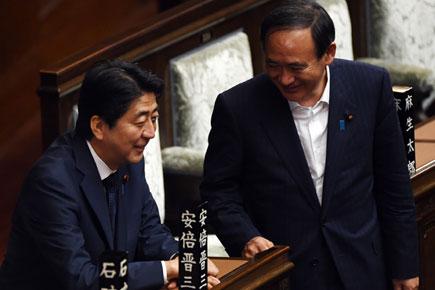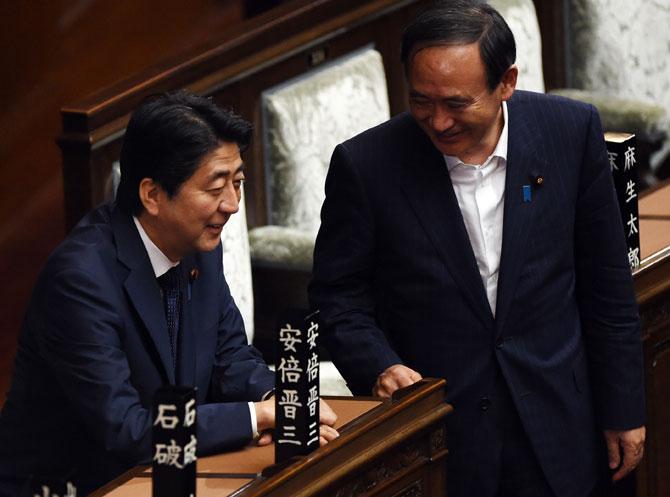Japan on Saturday abandoned its 70-year pacifism since the end of World War II as the parliament's upper house enacted a controversial legislation pushed forward by the government under Prime Minister Shinzo Abe

Japanese Prime Minister Shinzo Abe (L) chats with Chief Cabinet Secretary Yoshihide Suga (R) during a lower house no-confidence resolution on his cabinet, as the government attempts to pass the security bill at the parliament in Tokyo.
Tokyo: Japan on Saturday abandoned its 70-year pacifism since the end of World War II as the parliament's upper house enacted a controversial legislation pushed forward by the government under Prime Minister Shinzo Abe.
The legislation's enactment marked an overhaul in Japan's purely defensive defence posture, meaning the country could dispatch its troops overseas to engage in armed conflicts for the first time in seven decades, Xinhua news agency reported.
ADVERTISEMENT
 Japanese Prime Minister Shinzo Abe (L) chats with Chief Cabinet Secretary Yoshihide Suga (R) during a lower house no-confidence resolution on his cabinet, as the government attempts to pass the security bill at the parliament in Tokyo. Pic/AFP
Japanese Prime Minister Shinzo Abe (L) chats with Chief Cabinet Secretary Yoshihide Suga (R) during a lower house no-confidence resolution on his cabinet, as the government attempts to pass the security bill at the parliament in Tokyo. Pic/AFP
However, the country's war-renouncing Constitution bans its Self-Defence Forces (SDF) from doing so or exercising the right to collective self-defence.
Over 90 percent of Japan's constitutional experts believe that the legislation violates the Japanese supreme law.
The parliament's all-powerful lower house passed the bills in July.
Under the newly enacted legislation, Japan will create a permanent law to allow its SDF to carry out logistical support missions for foreign militaries in international peacekeeping operations, and other 10 existing security-related laws will be revised.
The enactment came after major opposition parties' tactics to delay the upper house vote by filing censure motions against the prime minister and the chairman of a panel under the chamber, as well as no-confidence motions against Abe's cabinet and the chamber's speaker.
However, all of the motions were voted down as the ruling bloc that groups Abe's Liberal Democratic Party and its small partner, the Komeito Party, secured the majority in both parliament chambers.
The prime minister told reporters after the vote that the result laid necessary legislation for Japan to exercise the right to collective self-defence.
The ruling camp will continue to explain the laws to the Japanese public, Abe said.
When the Abe-led ruling bloc passed the bills through the upper house, tens of thousands of protesters rallied around the national Diet building demanding the prime minister's resignation and the retract of the bills. Similar demonstrations were staged in other cities like Nagoya and Hiroshima.
 Subscribe today by clicking the link and stay updated with the latest news!" Click here!
Subscribe today by clicking the link and stay updated with the latest news!" Click here!







